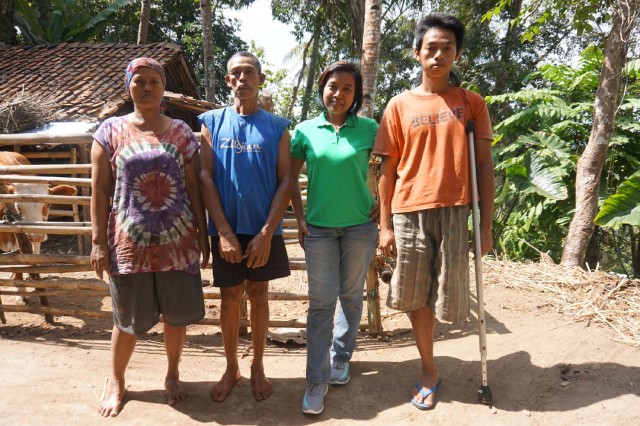It was 10 a.m. when I met Eko Sumitro, a young man welcoming my visit with his big smile at his simple house.
He has been part of Aliet Green’s project for more than five years.
I went there as part of a regular visit to meet farmers receiving Fair Trade Funds of the running Fair Trade projects. I am always excited to visit farmers in mountainous areas as my short recreation. However, this time, my visit was about analyzing the needs of disabled farmers due to farm accidents.
This Fair Trade project for disabled farmers, later called Social Farming, was launched in late 2017. This program aims to support disabled farmers who either can still work at farms or cannot do so at all.
Social Farming involves economic participation for vulnerable persons (e.g., people with physical disabilities due to farm accidents) to integrate into society. It does this by providing them with new skills and rewarding them with a feeling of usefulness and self-appreciation.
Farm accidents causing injuries include severe back, leg, or arm and leg impairments (including amputations) and spinal cord injuries.
Farm accidents are among the most prevalent workplace injuries.
Falling down the Coconut trees has become Aliet Green’s concern in all aspects considering Organic Coconut Sugar has been its main commodity. Unfortunately, there is no tool or technology to help farmers harvest the Coconut Blossom Sap until now. All carried out manually.
Eko Sumarito, 23 years old, an elementary school graduate, was once, like just one of the young Coconut farmers assisting his family by harvesting his income source through making Organic Coconut Sugar. He knew this primary income had fed his family since he was a baby.
Following Javanese tradition, as the family’s only child, he feels responsible for taking care of his parents. Who knew that Sumarito would experience a severe injury losing one of his legs due to falling off a Coconut tree. Climbing up the Coconut tree is a dangerous job to do, especially during the rainy season.
He was dispirited once he knew he only had one leg to struggle and harvest his income. However, it took Sumarito more than eight months to get used to his new life and understand the situation.
When I met him last week, he showed his dignity and strength that he has gone back to work and started climbing again. Sumitro is just one of the farmers experiencing bad farm accidents. He got back on his foot once he passed through a long misery losing his leg.
He is officially disabled, but he is full of a positive spirit because of his courage to take the challenge not to give up. Fortunately, his unique way of accepting the challenges gives others with a disability hope and strength.
Not only does he show farmers how they can still farm, but he provides the tough love to get them out of their self-pity and despair.
As a customer, you might not realize that when you receive or import at least one gram of Coconut Sugar, that farmers like Eko Sumitro produced one of the bags. Amazingly, he can still climb up some of the Coconut trees he owns. His mother helps boil the harvested Coconut Blossom Sap every day. He also involves another climber to harvest the rest of his Coconut trees, which he cannot reach due to mountainous area, by profit sharing (two days output to the owner, e.g., Eko Sumitro and two days to the climber).
Farmer income varies significantly depending on trees tapped and ownership model. However, the estimated hourly labor income being a Coconut Sugar farmer is US$ 0.65. As this way continues, farmers can live above the regional minimum wage stated by the local government.
Aliet Green believes Social Farming can embrace all economic aspects reaching out to disabled farmers like Eko Sumitro. Sumitro deserves decent living conditions for his hard work producing Coconut Sugar with international standards.

